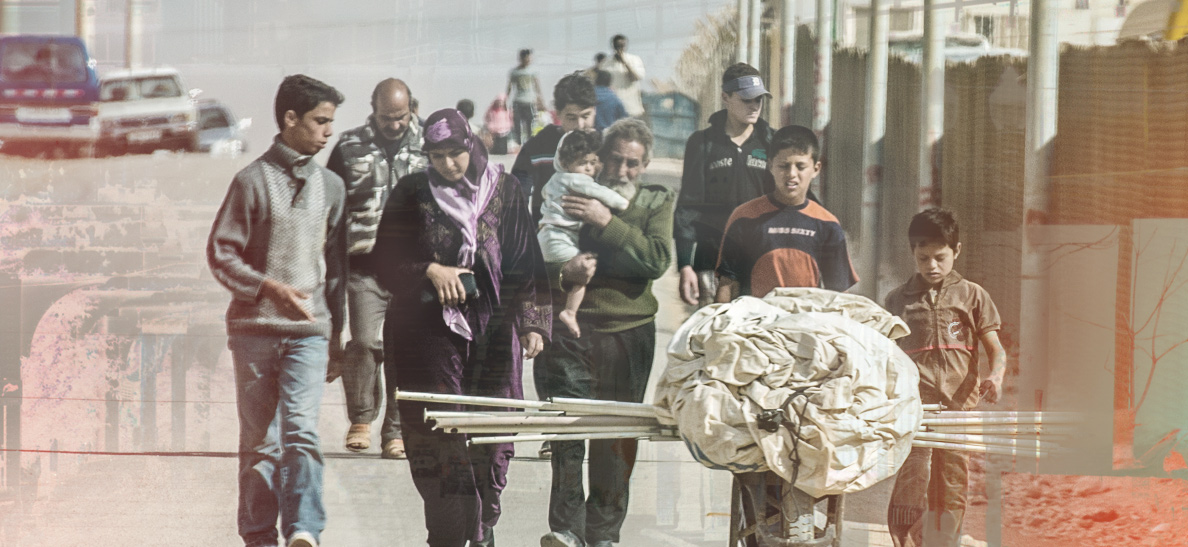
He spoke softly in English with a slight accent. He told me his name was Sammy and when I asked if he was Syrian, he offered a wry smile. “I was Syrian, but now I’m just a refugee.”
We were sitting in Jordan’s Zaatari refugee camp, the second largest refugee camp in the world, located just eight miles from the Syrian border.
At 25 years old, Sammy once had a bright future. He had studied aeronautical engineering and was training to work as a pilot. Like other young men, his service in the Syrian army was deferred until he graduated. But then the war began and he fled with his family. His passport was no longer valid and there was no time to gather other records. He fled over the border into Jordan without valid travel documents or proof of his training and became defined by a new title: refugee.
Sammy’s language skills helped him find work with Mercy Corps, an international NGO working in Zaatari Camp. There he helps organize sports programs for the youth in the camp. But his future is uncertain. The rest of his family was able to resettle in Algeria. Without a valid passport, he is stuck in a UN refugee camp in Jordan for the foreseeable future.
The Plight of Refugees
Sammy is just one of the more than 45 million people in the world who have been displaced by war, political or religious persecution, or other conditions that caused them to leave home. Most of their stories are heartbreaking. They are often traumatized and penniless. They arrive in a different part of their own country (those who flee their home but do not cross the border into another country are called Internally Displaced Persons) or in a strange land where the language and customs are often different and they are tolerated at best.
Refugees do have some protections. After World War II, the UN created the 1951 UN Refugee Convention to ensure the safety of those fleeing persecution. Updated in 1967, the act defines who is a refugee and helps establish the rights of those who have fled to a foreign land. The UNHCR is the agency that coordinates the protection of refugees by registering them, helping establish refugee camps and providing other services to those who are fleeing their homeland.
World Refugee Day (recognized today, June 20) commemorates the displaced people of the world. Yet every day, thousands more must leave home because of war, upheaval and strife. Watching them flee Syria, Iraq or the other countries in the news makes the situation seem far away. What can the average person do to help refugees? Here are some things to consider:
Helping Refugees Is Part of Our Biblical Mandate.
In the Old Testament, God commands the Israelites to “love the stranger” (Deuteronomy 10:19) and provide both shelter and sanctuary. Jewish law emphasizes this as a sacred principle and Christian teaching includes the words of Jesus from Mathew 25:35: “For I was hungry and you gave me something to eat, I was thirsty and you gave me something to drink, I was a stranger and you invited me in.”
There Are Refugees in Your Community
Refugees are resettled in the U.S. through volunteer organizations that work with the State Department to receive refugees, find them housing and jobs and help them adjust to a new country. Resettlement agencies in the U.S. include: Church World Services, Episcopal Migration Ministries, Lutheran Immigration and Refugee Services and World Relief. These groups partner with local churches to work with those who have entered the U.S. as refugees.
Matthew Soerens of World Relief says, “We work with local churches to serve the most vulnerable. Refugees—who arrive with almost nothing, usually having experienced devastation in their country and during their escape—definitely fit the ‘most vulnerable’ category.
“Frankly, the needs are just too significant for the government and the non-profit sector to meet without the partnership of the local church.”
The resettlement agencies have more than 300 local partners in communities throughout the country. Churches help by teaching newcomers English, helping them find housing and jobs and offering the support of a community.
Faith-Based Organizations Are Working on the Frontlines.
Organizations like World Vision International work in refugee camps and in communities to help provide for basic needs and offer education for the children. In Jordan, where 80 percent of the refugees cannot be accommodated in camps, World Vision provides community-based Child Friendly Spaces, where children can play and learn without fear, and trained counselors help children recover from trauma and adjust to their new lives.
Refugees are, by definition, people who are fleeing violence or persecution. They are often traumatized and in need of the most basic care. On World Refugee Day—and whenever you see refugees in the news—take a minute to ask what you can do. Contact the organizations mentioned here or check with your local church. Pray and ask God to open your heart to the refugees of the world—and then act. In the words of the One who was born a refugee: “Truly I tell you, whatever you did for one of the least of these brothers and sisters of mine, you did for me.”






















